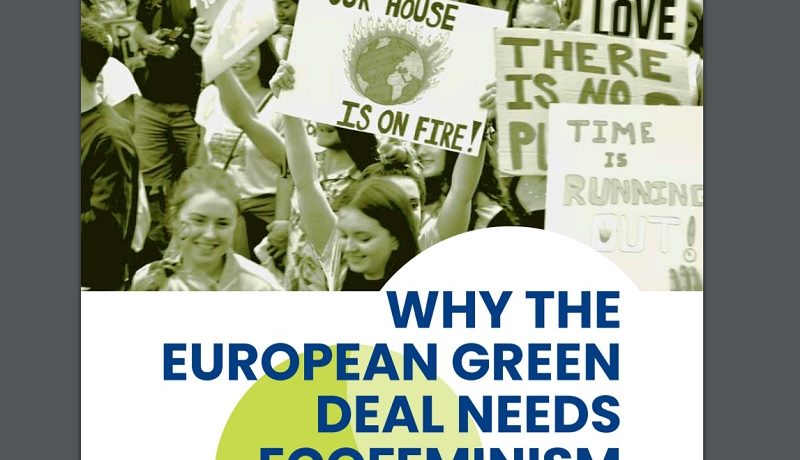European Green Deal’s gender blind spots set to widen inequalities and weaken environmental protection. Despite the European Union’s declared commitment to gender equality, women are invisible in the EU’s flagship European Green Deal, which risks turning the gender gap into a chasm and delaying the transition to sustainability, concludes a major new report.
The environment and gender have topped the European Union’s political agenda since Ursula von der Leyen became president of the European Commission. This is reflected in the EU’s flagship European Green Deal and its Gender Equality Strategy (2020-2025), which seeks to create a Union of Equality.
However, despite these high-level commitments, the proven intersection between gender and the environment is missing from the EU’s green transition, which risks widening the already significant gap between men and women in Europe, according to a major new report.
Missing in inaction
‘Why the European Green Deal needs ecofeminism’ highlights the link between gender and the environment, exposing the missing gender dimension from EU policies. The report is presented by the European Environmental Bureau (EEB) and Women Engage for a Common Future (WECF), with support from the Austrian and German environment ministries, Heinrich Böll Foundation and the Climate of Change project.
“The climate crisis is one of the key challenges of our time and affects men and women quite differently. For instance, the majority of people impacted by energy poverty are women,” explains Austrian Minister for Climate Action Leonore Gewessler. “It is therefore crucial, to take gender differences into the equation, if we want to develop solutions and a transformation that works for everyone.”
“The European Green Deal policies are, at best, gender-blind and, at worst, widen gender inequalities,” notes the EEB’s Nadège Lharaig, a co-author of the report. “By adopting an ecofeminist framing in policymaking, the EU can create more effective, impactful, acceptable and gender-transformative policies.”
“Climate justice means recognising the overlapping forms of discrimination and barriers all genders are facing. Climate policies will never be people-centred if they lack an intersectional dimension,” said Miriam Müller, a WECF trustee and member of the advisory board of the report.
Greenprint for change
The report does not only highlight problems but also proposes solutions. It provides a blueprint for transformative change in EU policies to ensure that the environmental and economic transitions make Europe both greener and fairer.
“Concrete solutions include dedicating more funds to research and data collection on the gender-environment nexus, recognising the benefits of care work for the green transition or applying gender mainstreaming methodologies in environmental policies,” says Lharaig. “For this to happen, we need strong political will.”
Farming is a good example of where gender-sensitive policies would bear fruit
“Women agricultural producers are more likely to use regenerative farming practices and soil restoration,” observes Sally Shortall, Duke of Northumberland Chair of Rural Economy at Newcastle University and a co-author of the report. “If the different impact of women farmers is recognised and valued, our policies can become more effective.”
In related news, another recent report, produced by the EEB in collaboration with Oxfam Germany in the context of the Climate of Change project, also provides solutions for how the gender dimension can be integrated into the transition towards a wellbeing economy.
The European Environmental Bureau (EEB) is Europe’s largest network of environmental citizens’ organisations, standing for environmental justice, sustainable development and participatory democracy. Our experts work on climate change, biodiversity, circular economy, air, water, soil, chemical pollution, as well as policies on industry, energy, agriculture, product design and waste prevention. We are also active on overarching issues as sustainable development, good governance, participatory democracy and the rule of law in Europe and beyond.
We have over 160 members in over 35 countries.
Articoli recenti
Archivi
- Agosto 2024
- Luglio 2024
- Giugno 2024
- Maggio 2024
- Aprile 2024
- Marzo 2024
- Febbraio 2024
- Gennaio 2024
- Dicembre 2023
- Novembre 2023
- Ottobre 2023
- Settembre 2023
- Agosto 2023
- Luglio 2023
- Giugno 2023
- Maggio 2023
- Aprile 2023
- Marzo 2023
- Febbraio 2023
- Gennaio 2023
- Dicembre 2022
- Novembre 2022
- Ottobre 2022
- Settembre 2022
- Agosto 2022
- Luglio 2022
- Giugno 2022
- Maggio 2022
- Aprile 2022
- Marzo 2022
- Febbraio 2022
- Gennaio 2022
- Dicembre 2021
- Novembre 2021
- Ottobre 2021
- Settembre 2021
- Agosto 2021
- Luglio 2021
- Giugno 2021
- Maggio 2021
- Aprile 2021
- Marzo 2021
- Febbraio 2021
- Gennaio 2021
- Dicembre 2020
- Novembre 2020
- Ottobre 2020
- Settembre 2020
- Agosto 2020
- Luglio 2020
- Giugno 2020
- Maggio 2020
- Aprile 2020
- Marzo 2020
- Febbraio 2020
- Gennaio 2020
- Dicembre 2019
- Novembre 2019
- Ottobre 2019
- Settembre 2019
- Agosto 2019
- Luglio 2019
- Giugno 2019
- Aprile 2019
- Marzo 2019
- Febbraio 2019
- Gennaio 2019
- Dicembre 2018
- Novembre 2018
- Ottobre 2018
- Settembre 2018
- Luglio 2018
- Giugno 2018
- Maggio 2018
- Aprile 2018
- Marzo 2018
- Febbraio 2018
- Gennaio 2018
- Dicembre 2017
- Novembre 2017
- Ottobre 2017
- Settembre 2017
- Agosto 2017
- Luglio 2017
- Giugno 2017
- Maggio 2017
- Aprile 2017
- Marzo 2017
- Febbraio 2017
- Gennaio 2017

